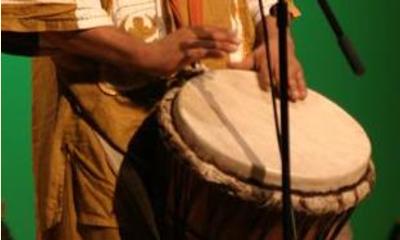|
|
Music and Culture of Peace
an article by Maisoon Ateem, Nurana Rajabova, and Philomena Modu
Music knows no borders - it can be understood everywhere without
any language. Some say it is the universal language as it cuts through
all cultures. Since the beginning of human history music has always
been part of the people used to express their feelings and ideas. Music
has the soothing feature that makes one calm when angry or in
discomfort. It is also used as a means of therapy for people who suffer
in mental problems of something. Thus in the promoting of the culture
of peace many festivals/ organisations such as up with people use music
in the promotion of learning different cultures.

click on photo to enlarge
Every
culture is known for its unique aspects of music which could be used as
a means of communication and social organisation. In Africa it is a
tool that is widely as a form to cleanse the community after clashes or
wars where the spirits could be appeased and the dead sent to sleep
peacefully. So as Sudan has diverse ways of how they use music to
mobilise inform and sensitise the community. For example the sounds of
drums could be used to indicate the reconciliation among different
peoples in their specific regions.
In the north they use "nugara" a type of drum that is used to
call people to peace and negotiation. It is used after the war to bridge
the gap and promote harmonious living to create a platform where the
people could discuss the issues. Further, other instruments like
"tumbour" which is like the kind of wood with plastic strings that is
played by the hand to produce sound during weddings which are used as a
tool to bring together different groups of peoples in a bond through
marriage for the promotion of peaceful coexistence.
Since music has a profound impact on people it is always an
effective tool that is necessary to be used in our communities to
sustain the culture of peace.
|








|
DISCUSSION
Question(s) related to this article:
What place does music have in the peace movement?
Thematic forum(s) in which this article is being discussed:
THE ARTS - LES ARTS
Latest reader comment:
Rama -
Thanks for that. Yes, that event was a key moment that illustrated a
possible future for Jamaica, but was it really the music that did it? Is
it possible that it could have happened with a different musician, or a
famous sports person instead, or any other popular figure in front of
that many onlookers? Music was the medium in this case in which an event
and media-moment was staged to positive effect, but the music itself on
that occasion did not do much. It is possible to say that from that
moment reggae took on a newer and more profound meaning to a number of
Jamaicans as they took it to represent their collective identity and
this followed them whether or not they stayed in Jamaica or immigrated
to other areas, New York for example, where dancehall reggae culture
provided the platform for the emergence of hip hop, which is a closer
example of music working somewhat towards reducing conflict, at least
until the original message became appropriated for other, opposite
means. So I'm afraid that saying music creates peace or even fosters it
is just not accurate in the case of Bob Marley.

|
|
|
This report was posted on August 10, 2011.
If you wish to start a new discussion topic on this article, please copy the title of this article which is Music and Culture of Peace and its number which is 527 and enter this information along with your discussion question and an introductory response to the question here.

A few stories are retained on the main listings if they are considered
by readers to be a priority. If you have not already done so, please
take the time to check a box below: should this article be considered as
a priority?

|







